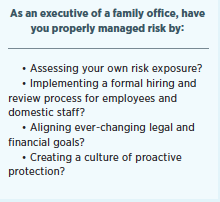When it comes to assessing the liabilities within a family office, the executive who manages that office should view the ramifications in the same way a corporation would.
If structured correctly, a family office assumes many of the same risks as other financial services or trust organizations. Hiring employees, overseeing outsourced professionals, performing investment services and assisting with the placement and management of domestic staff are a few examples of the tasks requiring proper risk mitigation for family office executives, staff and clients.
First, consider the risks facing family office executives: Directors and officers of a family office carry the same responsibility as their counterparts in public companies. If they fail to perform their fiduciary duties, their office and clients will be affected.
Therefore, it is imperative that a family office put proper vetting mechanisms in place before hiring or naming these executives. Other protections, such as by-laws, documentation and insurance, should also be implemented in advance to ensure ongoing compliance.
The success of a family office depends on a mindset by its management of proactive protection.
Second, employment practices for hiring family-office employees or domestic staff for clients should follow the same laws as a corporation would. Practices such as background checks, validation of references for hiring referrals and the collection of any pertinent documentation will mitigate some of the pre-hire risk.
Written job descriptions, expectations and parameters, ongoing performance reviews and proper insurance will further protect the family office and its employees.
Third, family-office clients often face a host of other exposures, including legal and investment challenges, reputational issues, cyber risk and physical security threats. Each one of these areas should be assessed and discussed with legal counsel, financial advisors, risk-management professionals and security consultants to develop a plan that can be reviewed on an annual basis.
The success of a family office depends on a mindset by management of proactive protection. Thinking of a family office as a corporation, with all the possible risks that may arise in that setting, will help family-office executives mitigate and respond to risk regarding those offices’ management, employees and clients. This due diligence approach ultimately builds trust. And trust is the hallmark of any family office that relies on relationships, transparency of information and the multi-generational protection of wealth and reputation.

This article was originally published in the May–July 2017 issue of Worth.
















